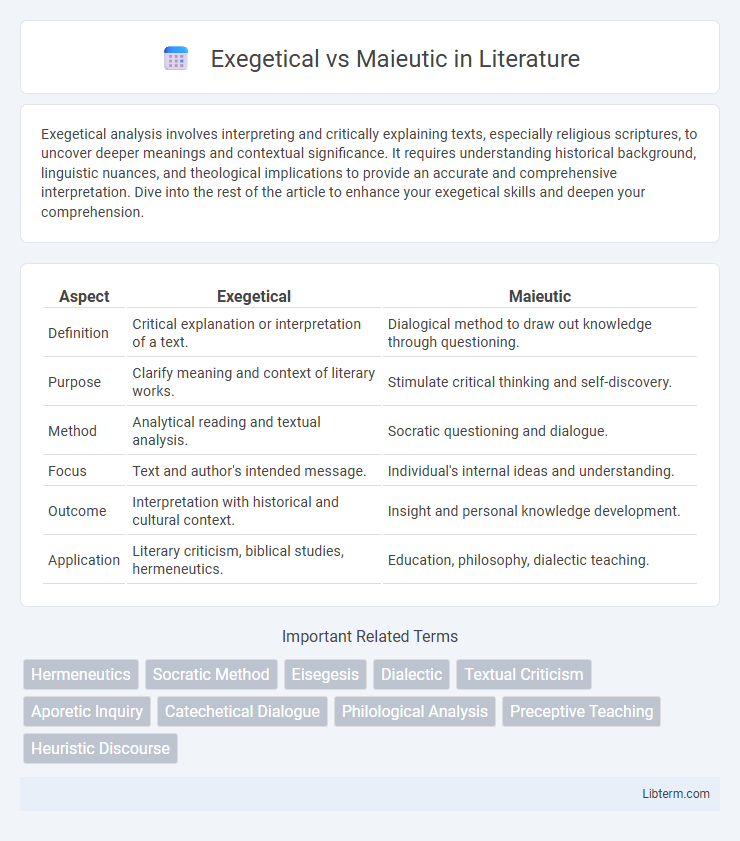Exegetical analysis involves interpreting and critically explaining texts, especially religious scriptures, to uncover deeper meanings and contextual significance. It requires understanding historical background, linguistic nuances, and theological implications to provide an accurate and comprehensive interpretation. Dive into the rest of the article to enhance your exegetical skills and deepen your comprehension.
Table of Comparison
| Aspect | Exegetical | Maieutic |
|---|---|---|
| Definition | Critical explanation or interpretation of a text. | Dialogical method to draw out knowledge through questioning. |
| Purpose | Clarify meaning and context of literary works. | Stimulate critical thinking and self-discovery. |
| Method | Analytical reading and textual analysis. | Socratic questioning and dialogue. |
| Focus | Text and author's intended message. | Individual's internal ideas and understanding. |
| Outcome | Interpretation with historical and cultural context. | Insight and personal knowledge development. |
| Application | Literary criticism, biblical studies, hermeneutics. | Education, philosophy, dialectic teaching. |
Introduction: Understanding Exegetical and Maieutic Approaches
Exegetical approaches emphasize critical interpretation and explanation of texts, aiming to uncover original meanings within historical and cultural contexts. Maieutic methods focus on eliciting ideas and knowledge through guided questioning, encouraging self-discovery and deeper understanding. Understanding these distinct methodologies enhances analytical skills in fields like theology, philosophy, and education.
Defining Exegetical Methodology
Exegetical methodology involves a systematic approach to interpreting texts, especially religious scriptures, by analyzing context, language, and historical background to uncover original meanings. This approach prioritizes extracting the author's intended message through critical examination of textual evidence and linguistic nuances. It contrasts with the maieutic method, which emphasizes drawing out knowledge through guided questioning rather than direct textual interpretation.
Unpacking the Maieutic Approach
The maieutic approach emphasizes drawing out knowledge through skilled questioning, fostering critical thinking and self-discovery rather than merely interpreting texts like the exegetical method. This dialectical technique encourages learners to articulate underlying assumptions and refine their understanding by engaging in dialogue. Rooted in Socratic teaching, maieutics promotes active intellectual engagement, enabling deeper comprehension by unpacking implicit meanings from within the student's own reasoning process.
Historical Roots and Philosophical Foundations
Exegetical methods trace back to ancient biblical and classical traditions, emphasizing critical interpretation and uncovering original meanings through textual analysis rooted in Hermeneutics. Maieutic techniques originate from Socratic philosophy, specifically Socrates' dialectical method, focusing on eliciting knowledge through guided questioning that draws out latent ideas. Both approaches reflect foundational epistemological concerns: Exegesis aligns with interpretative clarity and authorial intent, while Maieutics prioritizes internal cognitive discovery and the developmental nature of understanding.
Key Differences Between Exegetical and Maieutic Techniques
Exegetical techniques focus on interpreting and explaining texts, especially religious or literary works, by extracting explicit meanings and understanding author intent through critical analysis. Maieutic techniques, rooted in Socratic dialogue, aim to draw out latent knowledge or ideas from the interlocutor by asking guiding questions rather than providing direct explanations. The key difference lies in exegetical methods emphasizing text-centered interpretation, while maieutic methods prioritize eliciting internal insights through interactive questioning.
Applications in Religious and Philosophical Contexts
Exegetical methods are applied in religious contexts to interpret sacred texts by uncovering original meanings, facilitating doctrinal clarity and theological study. Maieutic techniques are employed in philosophical dialogues and spiritual counseling to draw out latent ideas and self-knowledge through guided questioning. Both approaches enhance critical thinking and deepen understanding in scriptural analysis and ethical inquiry.
Strengths and Limitations of Exegetical Analysis
Exegetical analysis offers the strength of a rigorous, text-centered approach that uncovers original meanings and theological intent by closely examining language, context, and historical background. Its primary limitation lies in the potential for rigidity, as it may overlook contemporary interpretations or dynamic reader responses, restricting insights to the original text's framework. This method excels in providing authoritative clarity but can struggle to address evolving cultural or experiential understandings.
Advantages and Challenges of the Maieutic Method
The maieutic method encourages critical thinking and self-discovery by guiding individuals to uncover knowledge through questioning, fostering deeper understanding and retention. Its advantage lies in promoting active engagement and personalized learning, which can lead to more meaningful insights compared to the expository approach used in exegetical methods. However, challenges include the time-intensive nature of the method and the dependency on skilled facilitators to ask effective questions that stimulate productive dialogue without causing confusion or frustration.
Case Studies: Exegetical vs. Maieutic in Practice
Case studies comparing exegetical and maieutic methods reveal distinct approaches to knowledge extraction: exegetical focuses on interpreting texts or data through established frameworks, while maieutic emphasizes eliciting hidden insights via guided questioning. In educational settings, exegetical techniques enhance comprehension of canonical materials, whereas maieutic strategies foster critical thinking and self-discovery among students. Analysis of real-world applications shows that combining both methods can optimize understanding and stimulate deeper engagement with complex subject matter.
Choosing the Right Approach: Factors to Consider
Choosing the right approach between exegetical and maieutic depends on the context and objectives of the inquiry; exegetical methods emphasize detailed textual analysis and interpretation of explicit meanings, while maieutic techniques focus on eliciting underlying ideas through guided questioning. Factors to consider include the nature of the subject matter, the depth of understanding required, and the level of participant engagement desired. Selecting an approach aligned with these factors enhances clarity, insight, and effective communication in educational, theological, or philosophical settings.
Exegetical Infographic

 libterm.com
libterm.com